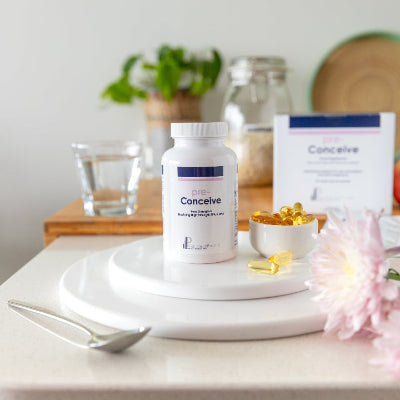Pillar Healthcare commissioned Europes first clinical study into the effect of a nutritional supplement on both male and female fertility. The study was performed by a clinical team at a leading fertility clinic, with the knowledge and expertise to conduct such a study.
The participants also consulted a nutritional therapist before the study and halfway through, to promote a healthy lifestyle. Five ‘Pillars' were advocated as part of our clinical study and they were developed by the formulator of pre-Conceive.
These five ‘Pillars’ will help to support whatever path you follow and with these simple changes, you can see big results. These guidelines are based on research showing how small, consistent changes in daily habits can enhance overall well-being and fertility potential.
The Results
During the 90 day study the participants took pre-Conceive and adhered to the five "pillars". After the 90 days we re-tested the participants and found improvements in the below fertility markers.

Five Pillars
1. Stay Hydrated
Recommendation:
We recommend drinking at least 2 litres of water daily and reducing excessive caffeine and alcohol intake, which can contribute to dehydration.
Why:
Water is fundamental to every function in the body, including reproductive health. Proper hydration ensures that nutrients are efficiently transported throughout the body, aiding in hormone balance, optimal circulation, and the production of cervical mucus, which is crucial for conception.
Dehydration can lead to fatigue, hormonal imbalances, and poor cell function, all of which can negatively impact fertility.
2. Keep Moving and Exercise Regularly
Recommendation:
We encourage moderate, enjoyable activities such as walking, swimming, yoga, or strength training at least 3-5 times per week. If you engage in lots of physical activity, just make sure you prepare for it and recover properly.
Why:
Physical activity plays a vital role in maintaining a healthy weight, reducing stress, and promoting optimal hormone levels. Regular exercise can improve insulin sensitivity, support cardiovascular health, and reduce inflammation, all of which are critical for reproductive health.
However, balance is key - both excessive exercise and a sedentary lifestyle can negatively affect fertility.
3. Reduce Processed Foods
Recommendation:
Cutting back on processed snacks, fast food, and sugary beverages can make a significant difference in energy levels, digestion, and hormonal function. By focusing on whole, nutrient-dense foods, individuals can improve their overall health and support the body's natural reproductive processes.
Why:
Processed foods are often high in artificial additives, unhealthy fats, and refined sugars, which will contribute to inflammation, poor gut health, and hormonal imbalances. Diets high in processed foods have been linked to reduced fertility in both men and women.
4. Choose Local and Seasonal Foods
Recommendation:
We recommend that you try and consume foods that were grown locally and those that are in season; where possible, organic as well.
Why:
Consuming local and seasonal foods ensures that individuals are getting the freshest, most nutrient-rich produce available. Seasonal fruits and vegetables are often harvested at their peak nutritional value, providing essential vitamins, minerals, and antioxidants that support reproductive health.
When compared to out-of-season foods, which are often picked early and lose nutrients during long transport - sometimes from different continents! Local foods generally have fewer chemicals, as they don’t require artificial ripening agents or extensive processing to extend shelf life. Locally sourced foods tend to be less processed and free from excessive preservatives, making them a healthier choice for fertility-focused nutrition.
And finally, eating seasonally supports a natural variety of nutrients throughout the year, promoting overall health and sustainability. And eat organic where possible, there are far fewer chemicals!!
5. Get it right....Most of the Time
Food is to be enjoyed. On a TTC journey, there is enough stress and our nutritional intake – possibly contradicting ourselves – while so important, shouldn’t become a burden. We adopt a policy of, Get it right....Most of the Time.
Yes, a diet rich in fruits and vegetables, complex carbs, choosing fish or lean meats, cooking them in the right manner, etc., provides an abundance of antioxidants, fibre, vitamins, and minerals that play a crucial role in reproductive health. However, a meal with friends, a dinner, a drink, a convenience option because we’re tired or late, a sugary desert, is not the end. Just Get it right, next time!
Why pre-Conceive Advocates for These Changes
At pre-Conceive, we understand that fertility is influenced by multiple factors, including genetics, environment, and lifestyle choices. Our recommendations are designed to support individuals with practical, evidence-based strategies that make it easier to conceive. These dietary and lifestyle adjustments not only support conception but also contribute to long-term health benefits, improving energy levels, mental clarity, and overall quality of life.
By adopting these five simple yet powerful habits, you can take proactive steps toward optimising your reproductive health. Our goal is to provide comprehensive support, guiding individuals through their fertility journey with scientifically backed solutions and compassionate care.
For more information about pre-Conceive and our ongoing research, feel free to reach out to our team. Together, we can make a difference in reproductive health and help individuals achieve their dreams of parenthood.






